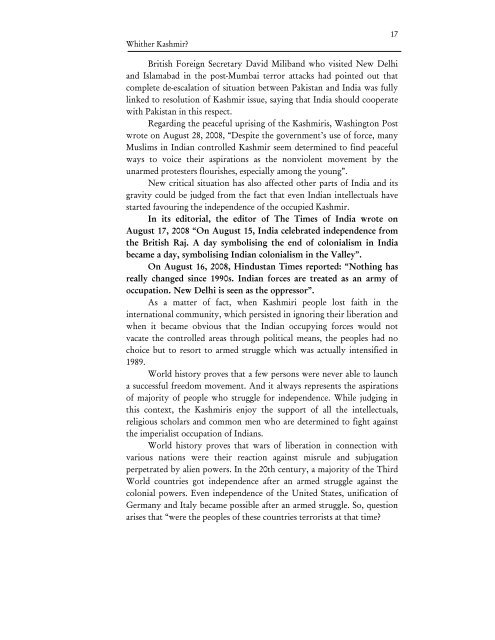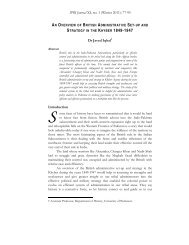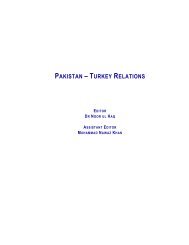120 Whither Kashmir? (Part II) - Islamabad Policy Research Institute
120 Whither Kashmir? (Part II) - Islamabad Policy Research Institute
120 Whither Kashmir? (Part II) - Islamabad Policy Research Institute
You also want an ePaper? Increase the reach of your titles
YUMPU automatically turns print PDFs into web optimized ePapers that Google loves.
<strong>Whither</strong> <strong>Kashmir</strong>?<br />
British Foreign Secretary David Miliband who visited New Delhi<br />
and <strong>Islamabad</strong> in the post-Mumbai terror attacks had pointed out that<br />
complete de-escalation of situation between Pakistan and India was fully<br />
linked to resolution of <strong>Kashmir</strong> issue, saying that India should cooperate<br />
with Pakistan in this respect.<br />
Regarding the peaceful uprising of the <strong>Kashmir</strong>is, Washington Post<br />
wrote on August 28, 2008, “Despite the government’s use of force, many<br />
Muslims in Indian controlled <strong>Kashmir</strong> seem determined to find peaceful<br />
ways to voice their aspirations as the nonviolent movement by the<br />
unarmed protesters flourishes, especially among the young”.<br />
New critical situation has also affected other parts of India and its<br />
gravity could be judged from the fact that even Indian intellectuals have<br />
started favouring the independence of the occupied <strong>Kashmir</strong>.<br />
In its editorial, the editor of The Times of India wrote on<br />
August 17, 2008 “On August 15, India celebrated independence from<br />
the British Raj. A day symbolising the end of colonialism in India<br />
became a day, symbolising Indian colonialism in the Valley”.<br />
On August 16, 2008, Hindustan Times reported: “Nothing has<br />
really changed since 1990s. Indian forces are treated as an army of<br />
occupation. New Delhi is seen as the oppressor”.<br />
As a matter of fact, when <strong>Kashmir</strong>i people lost faith in the<br />
international community, which persisted in ignoring their liberation and<br />
when it became obvious that the Indian occupying forces would not<br />
vacate the controlled areas through political means, the peoples had no<br />
choice but to resort to armed struggle which was actually intensified in<br />
1989.<br />
World history proves that a few persons were never able to launch<br />
a successful freedom movement. And it always represents the aspirations<br />
of majority of people who struggle for independence. While judging in<br />
this context, the <strong>Kashmir</strong>is enjoy the support of all the intellectuals,<br />
religious scholars and common men who are determined to fight against<br />
the imperialist occupation of Indians.<br />
World history proves that wars of liberation in connection with<br />
various nations were their reaction against misrule and subjugation<br />
perpetrated by alien powers. In the 20th century, a majority of the Third<br />
World countries got independence after an armed struggle against the<br />
colonial powers. Even independence of the United States, unification of<br />
Germany and Italy became possible after an armed struggle. So, question<br />
arises that “were the peoples of these countries terrorists at that time?<br />
17




